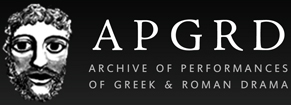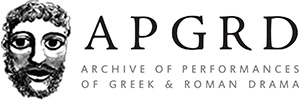 In addition to its own programmes, the APGRD also collaborates in projects funded by TORCH (The Oxford Research Centre in the Humanities).
In addition to its own programmes, the APGRD also collaborates in projects funded by TORCH (The Oxford Research Centre in the Humanities).
Penelope’s Web
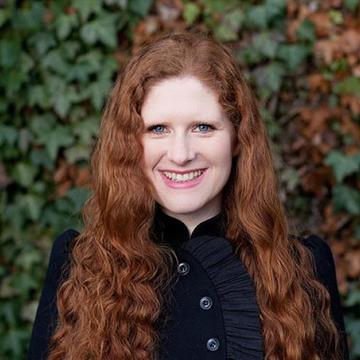
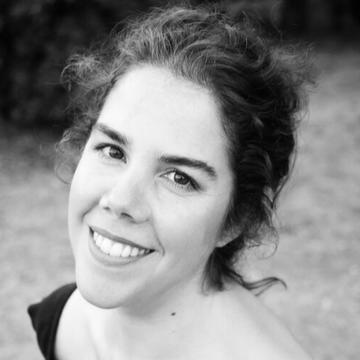 This project brings together creative artists and Oxford researchers to develop a new 90-minute opera based on Margaret Atwood's The Penelopiad (2005), by composer Dr Cheryl Frances-Hoad (right) and opera director/librettist Dr Jeanne Pansard-Besson (left). The opera, like Atwood's novella, turns the canonical narrative of Homer's Odyssey upside down: Odysseus' wife, Penelope, traditionally the model of marital fidelity and patient endurance, is given the chance to offer her side of the story from the underworld.
This project brings together creative artists and Oxford researchers to develop a new 90-minute opera based on Margaret Atwood's The Penelopiad (2005), by composer Dr Cheryl Frances-Hoad (right) and opera director/librettist Dr Jeanne Pansard-Besson (left). The opera, like Atwood's novella, turns the canonical narrative of Homer's Odyssey upside down: Odysseus' wife, Penelope, traditionally the model of marital fidelity and patient endurance, is given the chance to offer her side of the story from the underworld.
Now titled Penelope’s Web, the project consists of two workshops, the first of which will take place in Oxford from 14-19 April in the Jacqueline du Pre Music Building at St Hilda’s College and will involve students from the Cheney School (Oxford) and young singers from Frideswide Voices at Christ Church. The workshop will include a study afternoon on Thursday 18 April, 2-6pm, with contributions from Lucy Jackson, Justine McConnell, Alex Silverman, Laura Swift and Oliver Taplin and will culminate in a performance on Friday 19 April at 6pm, to which everyone is welcome.
Development
Under the project's orignal title, The Alternative Queen's Speech, the first aria was commissioned in 2021 from the National Opera Studio (see below), and during a three-day residency in the Jacqueline du Pre Music Building at St Hilda's College (6-8 June 2022), the composer, director/librettist, two singers and a student actor, worked together with researchers from Classics, English, Modern Languages and Music, and students from the Cheney School, Oxford. A public lecture/performance was held on Wednesday 8 June 2022 at 5pm. A film of the project has been made by filmmaker and photographer, Rocio Chacon ('an opera in the making' - see below). On 24 April 2023 a roundtable discussion, 'Penelope’s Song: Beginning to write an Odyssey Opera', was held at Keble College, Chaplain’s Office, with Cheryl Frances-Hoad and Jeanne Pansard-Besson sharing their initial thoughts and receiving input from those interested in the shaping of an operatic response to the story of the Odyssey. The APGRD is joining KCL, Princeton, NYU, and the English National Opera in the next stage of the opera’s development.
- Project Website: Penelope's Web - the Opera
- Video: The Alternative Queen's Speech: an opera in the making (TORCH YouTube)
- Video: Asphodel Aria - National Opera Studio (National Opera Studio YouTube)
- Original Website: The Alternative Queen's Speech (TORCH website)
Dancing with Apollo
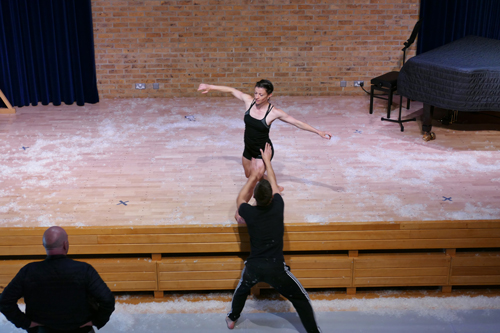 This TORCH/DANSOX/APGRD collaboration brings together a group of artists and Oxford researchers to begin research and development on a larger programme of dance, music and words: ‘Dancing with Apollo'. Spitalfields Festival has commissioned a new score from composer Edmund Finnis (A Duet in the Dark) and the week's residency will take place in Oxford from 4-9 July in the Jacqueline du Pre Music Building at St Hilda's College. The premiere will take place in London on Sunday 11 July 2021, 5.30pm at King's Place, London.
This TORCH/DANSOX/APGRD collaboration brings together a group of artists and Oxford researchers to begin research and development on a larger programme of dance, music and words: ‘Dancing with Apollo'. Spitalfields Festival has commissioned a new score from composer Edmund Finnis (A Duet in the Dark) and the week's residency will take place in Oxford from 4-9 July in the Jacqueline du Pre Music Building at St Hilda's College. The premiere will take place in London on Sunday 11 July 2021, 5.30pm at King's Place, London. 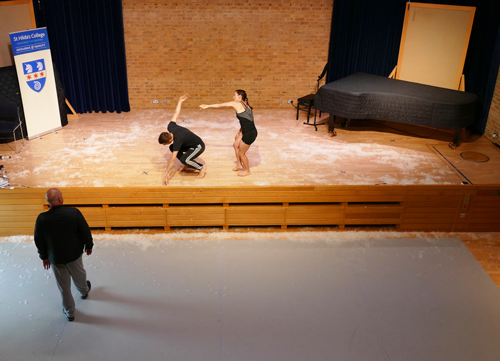
The residency will develop the first dance piece based on Cupid and Psyche, which was at the heart of the early modern quarrel between the ancients and the moderns and has particular resonance today with the ♯MeToo movement. The focus will also be on the myth's concern with touch, breath and lack of (fore-)sight - themes that speak especially powerfully to the dictates of the current pandemic.
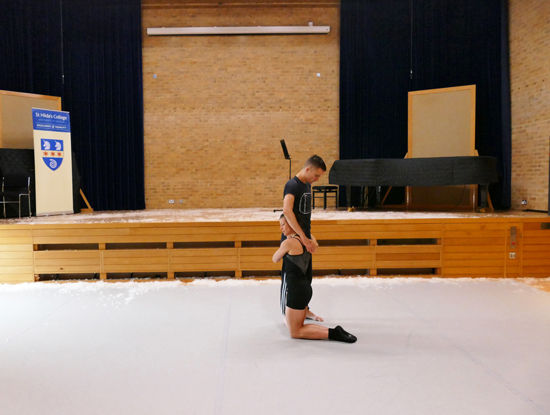 The residency involves celebrated choreographer, Kim Brandstrup and two professional dancers, Liam Riddick and Laurel Dalley-Smith, award-winning violinist, Sara Trickey and pianist, Ivana Gavric, with Marina Warner (All Souls) as dramaturg. Further academic engagement will come from Sue Jones (Director DANSOX), Fiona Macintosh (Director APGRD), and Stephen Harrison. A film of the workshop by distinguished film-maker Rocio Chacon will be made available following the residency.
The residency involves celebrated choreographer, Kim Brandstrup and two professional dancers, Liam Riddick and Laurel Dalley-Smith, award-winning violinist, Sara Trickey and pianist, Ivana Gavric, with Marina Warner (All Souls) as dramaturg. Further academic engagement will come from Sue Jones (Director DANSOX), Fiona Macintosh (Director APGRD), and Stephen Harrison. A film of the workshop by distinguished film-maker Rocio Chacon will be made available following the residency.
- Review: Beauty and insights as festival turns to classical mythology (Guardian 12 July 2021)
- Blog: Dancing with Apollo - Oxford Residency (by Sue Jones, DANSOX Director)
- Film: watch short film of the Oxford residency (available on YouTube from 30 July 4.30pm)
- Event: Premiere Performance at Hall One King's Place, London (11 July 2021)
- Website: Dancing with Apollo (TORCH website)
- Partners: DANSOX | Spitalfields Music | TORCH
Greek Tragedy: Masterclass on Film
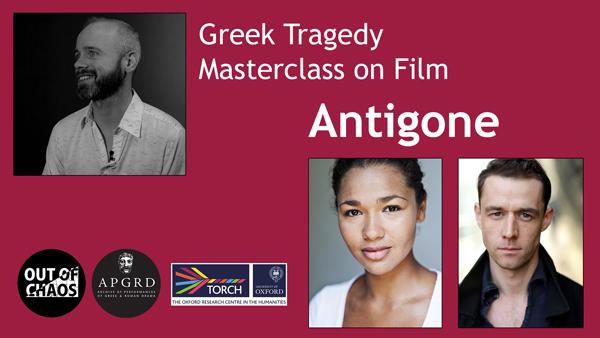 A TORCH-funded APGRD/Out of Chaos collaboration, ‘Greek Tragedy – masterclasses on film’ brings together international practitioners and experts to make a short film about Antigone aimed at online theatre audiences, as well as university and school students. The project builds on the success of Out of Chaos’ Reading Greek Tragedy Online.
A TORCH-funded APGRD/Out of Chaos collaboration, ‘Greek Tragedy – masterclasses on film’ brings together international practitioners and experts to make a short film about Antigone aimed at online theatre audiences, as well as university and school students. The project builds on the success of Out of Chaos’ Reading Greek Tragedy Online.
Two professional actors - Evelyn Miller and Tim Delap - will explore different interpretations with director Paul O'Mahony through discussion and in rehearsal, alongside talking heads from the creative industries and academia.
- Film: Greek Tragedy: Masterclass on Film: Antigone (TORCH YouTube)
- Film trailer: on TORCH YouTube
- Event: Live Discussion with participants, which took place before the premiere (11 June 2021)
- Website: Greek tragedy: masterclasses on film (TORCH website)
- Related Podcast: Paul O'Mahony, Joel Christensen, and Lanah Koelle on Reading Greek Tragedy Online
BAME Medea
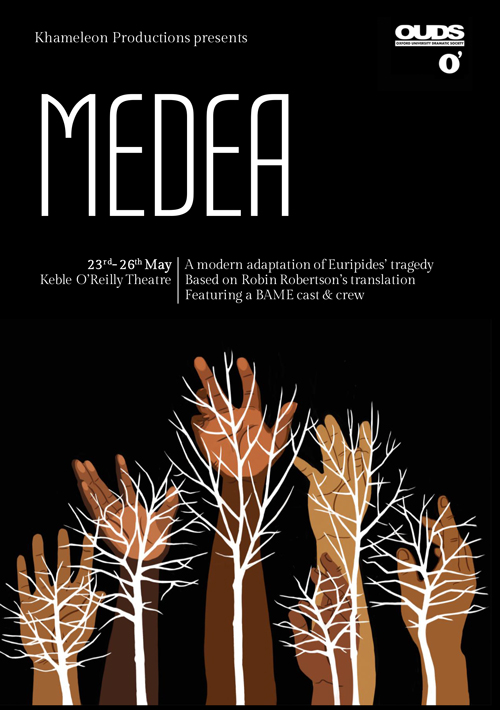 In May 2018 the Oxford University Drama Society (OUDS) performed a modern adaptation of Euripides' tragedy Medea with an all BAME cast and crew. Designed to tackle the lack of diverse theatre at Oxford University, the production was driven by the desire to bring numerous cultures and people of colour together to perform this powerful, classical story in a reimagined way, through original music, movement and spoken word.
In May 2018 the Oxford University Drama Society (OUDS) performed a modern adaptation of Euripides' tragedy Medea with an all BAME cast and crew. Designed to tackle the lack of diverse theatre at Oxford University, the production was driven by the desire to bring numerous cultures and people of colour together to perform this powerful, classical story in a reimagined way, through original music, movement and spoken word.
- Website: Ongoing development of the project (TORCH website)
- Video: A recording of the 2018 BAME Medea (YouTube)
- Programme Notes: 2018 BAME Medea programme (PDF)
- Review: Review of BAME Medea in Didaskalia (PDF)
- Podcast: Listen to Shivaike Shah and Fran Amewudah (APGRD Podcast)
- Blog: Medea: A Mirror for the 21st Century (APGRD Blog)
- Blog: Scholarship for the Classroom: BAME Medea (Cambridge School Classics Project Blog)
Chorus In Action
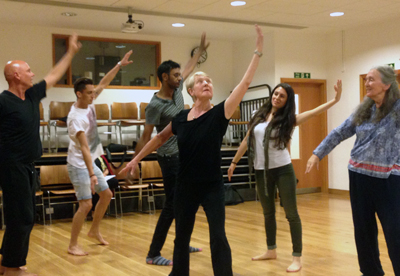 An interdisciplinary research initiative bringing together theatre practitioners, theatre historians and scholars of ancient Greek and Roman theatre in order to explore and forge new ways of staging the ancient chorus in theatre today. A parallel objective was to broaden scholarly conceptions of the dramatic potentials of the chorus both as an historical component the drama of Graeco-Roman antiquity and as a contemporary dramatic tool. This collaborative network
An interdisciplinary research initiative bringing together theatre practitioners, theatre historians and scholars of ancient Greek and Roman theatre in order to explore and forge new ways of staging the ancient chorus in theatre today. A parallel objective was to broaden scholarly conceptions of the dramatic potentials of the chorus both as an historical component the drama of Graeco-Roman antiquity and as a contemporary dramatic tool. This collaborative network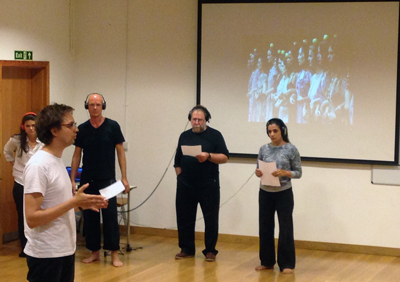 built on previous interconnections between the academy and the theatre by bringing together groups of academics and practitioners over a sustained period of time.
built on previous interconnections between the academy and the theatre by bringing together groups of academics and practitioners over a sustained period of time.
Ancient Dance in Modern Dancers
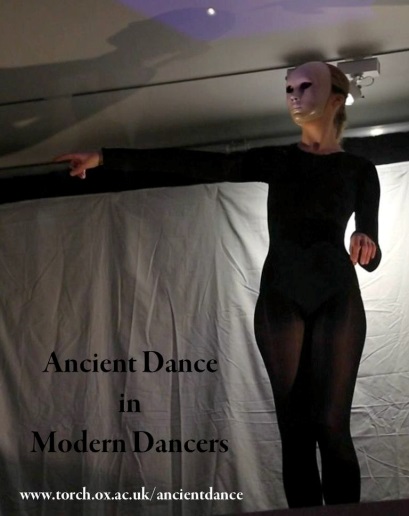 Ancient Dance in Modern Dancers was a collaborative practice-based study carried out by the APGRD in conjunction with the Institute of Social and Cultural Anthropology (ISCA), and funded by TORCH under the support scheme for interdisciplinary research networks. It ran a series of workshops involving professionally-trained dancers, investigating how they process selected stimulus materials en-route to creating a 'reconstructive' performance of the Roman dance form tragoedia saltata. It is not the final performance itself that is of interest so much as the cognitive responses of the participants. In this way, they hope to develop ways of articulating the knowledge derived from kinaesthetic engagement with ancient material.
Ancient Dance in Modern Dancers was a collaborative practice-based study carried out by the APGRD in conjunction with the Institute of Social and Cultural Anthropology (ISCA), and funded by TORCH under the support scheme for interdisciplinary research networks. It ran a series of workshops involving professionally-trained dancers, investigating how they process selected stimulus materials en-route to creating a 'reconstructive' performance of the Roman dance form tragoedia saltata. It is not the final performance itself that is of interest so much as the cognitive responses of the participants. In this way, they hope to develop ways of articulating the knowledge derived from kinaesthetic engagement with ancient material.
- Video: Sophie Bocksberger (Berrow Scholar, Classics) on Ancient Dance in Modern Dancers
- Event: Ancient Dance in Modern Dancers: A colloquium on approaches to dance research (1 Oct. 2013)
- Blog: Susie Crow, Telling stories in dance (Oxford Dance Writers Blog)
- Article: Nicolas Constans, Les Mystères de la Pantomime Romaine, Le Monde, 11 May 2014
